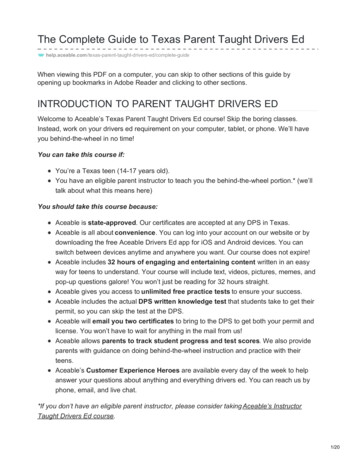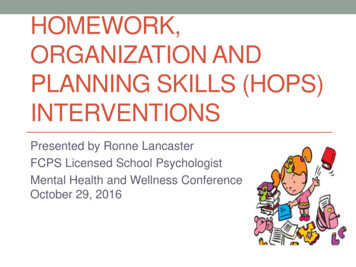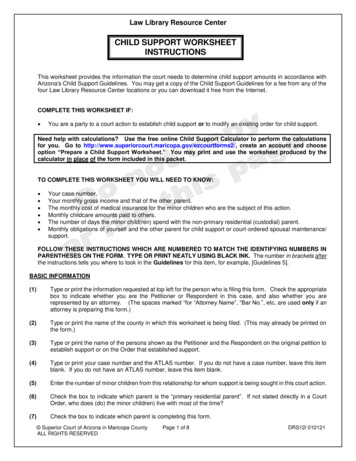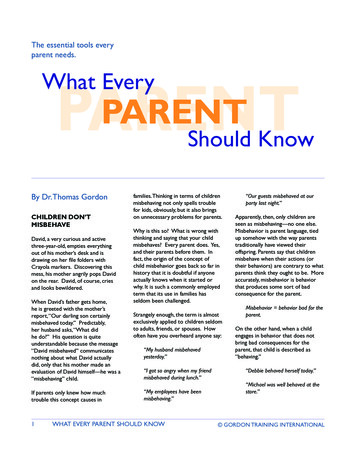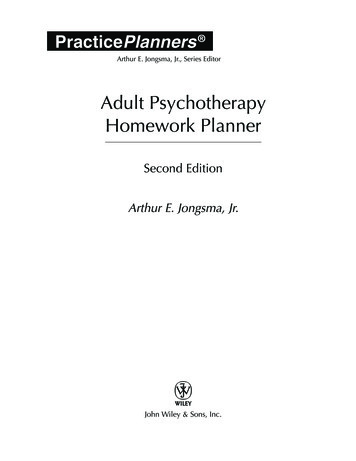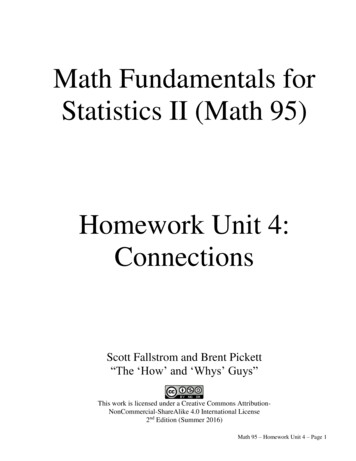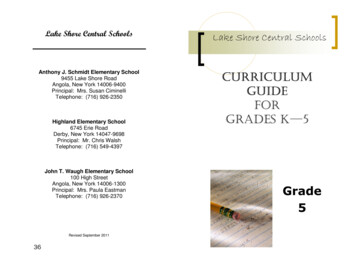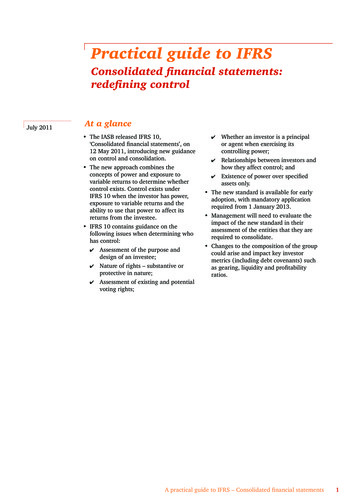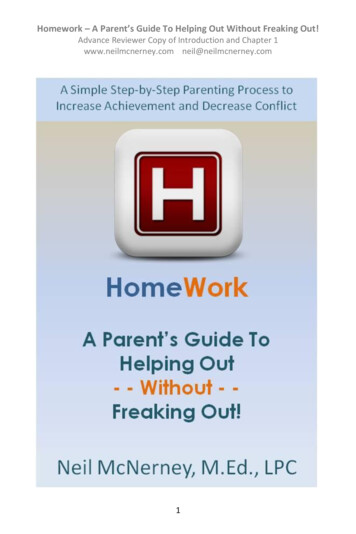
Transcription
Homework – A Parent’s Guide To Helping Out Without Freaking Out!Advance Reviewer Copy of Introduction and Chapter 1www.neilmcnerney.com neil@neilmcnerney.com1
Homework – A Parent’s Guide To Helping Out Without Freaking Out!Advance Reviewer Copy of Introduction and Chapter 1www.neilmcnerney.com neil@neilmcnerney.comTable of ContentsIntroductionChapter 1:Don‘t Freak Out!Chapter 2:What Kind Of Parent Are You?Chapter 3:Decoding Our KidsChapter 4:Understanding The Pressures Of ParentingChapter 5:What It Means To Be A KidChapter 6:The Mistakes We Make As ParentsChapter 7:Applying Homework Leadership Styles That WorkChapter 8:If They Only Understood Chapter 9:The Parenting FAQ‘sChapter 10: Myth Busting – A New Look At Homework SkillsChapter 11: Putting it Together—The 4-Step C.A.L.M Method2
Homework – A Parent’s Guide To Helping Out Without Freaking Out!Advance Reviewer Copy of Introduction and Chapter 1www.neilmcnerney.com neil@neilmcnerney.comIntroductionI‘d like to risk an assumption about why you are reading this book.The biggest reason is because you love your kids. Regardless of howprepared you were for having kids, the amount of love you feel forthem still surprises you. Because of that love, you want to doeverything you can to help them be successful in life. So when you sawthe title, you said to yourself ―If I can help my kid succeed in school,I‘d like to know how.‖But even though you love your kids, it‘s sometimes tough trying tohelp them be good students. It seems that sometimes, attempts youmake to help them be successful backfires, either by direct defiance ora passive ―I‘ll do it later.‖ Sometimes you wonder if your tough loveapproach could be softened a bit for better results.Like most parents, you have promised yourself that you will be abetter parent than the ones you had. You want to give your childreneverything they need to be a successful student. But doing everythingyou can to assure academic success seems to be backfiring. Maybe it snot going the way you thought it would. Maybe the more that you tryto help, the worse it gets. Maybe it‘s helping your child, but ruiningthe great relationship you used to have. Homework time has becomethe most stressed filled time of the day. Helping and being involvedsometimes just causes more hard feelings and doesn‘t seem to improvethings. You hope that there is a better way to do all you can to helpyour kids be successful without exhausting yourself or ruining yourrelationship with your kids. You are interested in reducing your ownstress about homework so that you can enjoy your kids again.3
Homework – A Parent’s Guide To Helping Out Without Freaking Out!Advance Reviewer Copy of Introduction and Chapter 1www.neilmcnerney.com neil@neilmcnerney.comAbout Me - Neil McNerney, LPCWhen I read a book, especially a parenting book, I want to know a bitabout the author. I ask myself: ―Is this person credible? Do they havethe credentials and experience to back up what they are saying?‖ Ifyou are similar to me in this way, let me tell you a bit about myself:I am a licensed professional counselor and have been licensed in thestate of Virginia since 1994. I spent seven years as a school counselor,dealing with most of the issues in this book. I am on the teachingfaculty of the Virginia Tech Graduate School of Marriage and FamilyTherapy, where I teach clinical techniques for working with childrenin a family context.I speak and train nationally and regularly provide workshops andkeynotes at state and national professional conferences. I have helpeddevelop a parent training program that is being used by hundreds ofprofessionals worldwide. My main focus of my work is increasingmotivation in children and increasing the leadership skills of parents.And, most importantly, my wife and I have two children whoconstantly challenge my assumptions about parenting, especiallywhen it comes to schoolwork. I am regularly amazed at the things theycan accomplish on their own, and I am regularly challenged to use theright approach based on what is going on with them at the time.What you will find in this book:A way to get rid of the constant cycle of worry, anger, temper,and then guilt.There is a reason why we are feeling more stressed, more guilty, andmore angry than parents of previous generations. We have been sold amyth about parenting that doesn‘t create better kids and in fact tendsto produce the very things we were trying to avoid. This book will helpyou understand these myths and provide a way to feel better about theway you are helping your child.4
Homework – A Parent’s Guide To Helping Out Without Freaking Out!Advance Reviewer Copy of Introduction and Chapter 1www.neilmcnerney.com neil@neilmcnerney.comA refreshing, new way to look at your children’s academicsThere is a place between feeling anxious and responsible for yourchild‘s school work on one extreme, and cutting off and leaving it up tohim on the other extreme. I will help you find this sometimes elusiveplace, a place where you can be most effective as a parent.A way to be an effective leader in your child’s life that leavesyou feeling good about your role in his life.I will share an approach to helping your child that will leave youfeeling good about your role in his life, instead of feeling stress andunsure. I will warn you: It‘s not an easy approach. It will require somework, and especially self control. But I assure you that the rewardswill be worth it.An approach to leading your student that has passed the testof time and professional scrutiny.There tend to be two types of parenting books on the market. Somehave very strong roots in the parenting profession. Books such as 1-2-3Magic, Parenting with Love and Logic, and ScreamFree Parenting arewhat professionals call ―theoretically valid.‖ They are based on proventheories of family systems and parent leadership. Other books,unfortunately, aren‘t so valid. As a teacher of the next generation offamily therapists and parenting professionals, it is my obligation tomake sure my book is not just helpful, but also stands the test of otherprofessionals.I have the pleasure of teaching at The Virginia Tech Graduate Schoolof Marriage and Family Therapy, where my students are learningabout family systems and becoming family therapists. When teachingsome of the concepts about parent leadership, the students often ask:―Why don‘t parents know about this stuff? Why is it limited tograduate students?‖ Good question. This was one of the questions and5
Homework – A Parent’s Guide To Helping Out Without Freaking Out!Advance Reviewer Copy of Introduction and Chapter 1www.neilmcnerney.com neil@neilmcnerney.comchallenges that led to me writing this book. The ideas I will share withyou are effective, challenging, and theoretically solid. If the ideas werenot grounded in a valid approach to family systems, my studentswould tear me up in an instant.My “Aha” MomentI began working with families in 1988 as an elementary schoolcounselor. I soon realized that my fascination was more about familydynamics than it was about working one-on-one with kids. So I wentback to school and got a degree in family counseling.During those early years (way way back in the 90‘s), I began to seethis slow but steady shift in how we parent our children. The SelfEsteem movement had begun in earnest, with the main concept being:If we can help a child feel good about himself, he will do better in life.We began focusing more and more energy on helping kids feel good, inhopes that he would then have the self confidence to face challengesand be more successful.Our focus became about the children. Teachers, parents, schools,everyone became very child focused. I should have started a bumpersticker company around then, because this was the time when webegan to emblazon our cars with great things about our kids. Honorroll students, students of the week, sports, and so on were made intostickers for everyone behind our car to see. Soon, everyone knew howwell our kids were doing in school and what sports they were excellingat just by looking at the back of our cars.Our goal was to make our kids feel good about themselves. Nothingwrong with that, right? But then an interesting thing began tohappen. We, the parents, started to blur the line between our kidsaccomplishments and our own accomplishments. We have told theworld (or at least our neighborhood) what great kids we have. ―Look atthe great things my kids are doing;‖ is what we are saying. It was our6
Homework – A Parent’s Guide To Helping Out Without Freaking Out!Advance Reviewer Copy of Introduction and Chapter 1www.neilmcnerney.com neil@neilmcnerney.comcars that sported the bumper stickers, not their bicycles or theirbackpacks. We, the parents, were the ones shouting the great news.We began to feel the pressure to keep it up. We started to look at everyslip up as a possible worry point. Instead of focusing on how we couldbe a leader, we began to get more and more involved, increasing ourown worry, and causing more conflict at home.I remember overhearing a conversation as a father picked up his sonat school. The dad was reviewing a social studies test and, obviously,the kid didn‘t do spectacularly. ―Look out there at my car,‖ the fathertold his son. ―See the honor roll bumper sticker?‖ ―Yeah,‖ said his son,looking down and knowing what he would hear next: ―Do you want meto rip that honor roll sticker off? Do you? I can‘t leave that on my car ifthis is the type of work you bring home.‖I know. Pretty harsh dad, right? Absolutely. It‘s what I call, in atwisted way, a ―feel good‖ story. No, the story itself doesn‘t feel good.The story makes me feel good as a dad, because at least I‘m not as badas that dad!But if I told you that I don‘t feel the same worries as the bumpersticker dad, I would be lying. When my kids are doing well and theyare on a roll academically, everything is happiness and rainbows. Butlet one paper come home that looks like a slip up, and I start to feelthose same worries. I start to take my kids work personally.It was at that point, just a few years ago, that I happen to come acrossa book called ScreamFree Parenting. The author, Hal Runkel, put inwriting what I have seen slowly coming to grips with: When webecome too child-focused, we lose our sense of self and end up takingour kid‘s ups and down too personally. I have worked with Hal andThe ScreamFree Institute for the past three years developing aprofessional training model that helps parents stay calm andconnected to their kids. We have had the good fortune to touch the7
Homework – A Parent’s Guide To Helping Out Without Freaking Out!Advance Reviewer Copy of Introduction and Chapter 1www.neilmcnerney.com neil@neilmcnerney.comlives of thousands of parents and train hundreds of professionals,especially on US military bases and posts throughout the world.The Parent’s DilemmaThere are many dilemmas we face when it comes to parenting ourkids. If we do too little, we might end up being neglectful. Our kidswon‘t get all of the opportunities, structure, and discipline necessaryto do well in life. If we do too much, we run the risk of decreasing theirinternal motivation. We run the risk of increasing our resentment,anger and worry. And we run the risk of them actually doing worse inschool.Our goal is to find that ―just right approach‖ that provides leadershipbut doesn‘t produce resentment. But in order to do that, we are facedwith one dilemma after another.I had to Google the word ―dilemma‖ to make sure I was using the rightword. Instead of giving you Webster‘s definition, I‘ll use the firstdefinition that came up on the internet. It was from, of course,Wikipedia:A dilemma (Greek: δί-λημμα "double proposition") is problem offeringat least two possibilities, neither of which is practically acceptable.Dilemmas are the one constant thing we deal with as parents. Theycome up over and over again. Take, for instance, trust. I discuss thisissue in detail in chapter 8. Our kids want to be trusted. We want totrust them. But they keep being sneaky, and sometimes boldly lying tous. Here‘s the dilemma: ―If I trust you more, you will just lie again andagain. If I don‘t trust you, there will always be tension between us. Iwill always have my detective badge on, and you will always feel like asuspect.‖8
Homework – A Parent’s Guide To Helping Out Without Freaking Out!Advance Reviewer Copy of Introduction and Chapter 1www.neilmcnerney.com neil@neilmcnerney.comSometimes dilemmas can go away, just by thinking about the issue ina bit of a different way. I am going to teach you how to look at aproblem a bit differently.In my private practice, I remember a student who taught me aboutseeing things differently. He was ten years old at the time. He and hisparents were working with me on increasing his focus and motivationin school. Things had gone well and we were finishing up thecounseling process. It was our last session. The first thing he said wasthat he is looking at his problems differently than before.―In what way?‖ I asked him.―Well, whenever me and my mom and dad would come in with aproblem, we were always looking at the problem front-ways.‖I wasn‘t sure what ‗front-ways meant, but I didn‘t want to interrupt.He continued: ―And then you would say something or ask a questionthat made us look at the problem different. It was like you werelooking at the problem side-ways. Instead of front-ways.‖―How did that help?‖ I asked. I wasn‘t exactly clear yet what hemeant, so I was stalling for time!―When we started looking at the problem side-ways, we were able tosee new answers instead of just the problem,‖ he said.Now I got it. I was impressed. This ten year old had just capturedwhat I try to do for kids and families: change how they see theproblem. If we change how we see problems, solutions are just aroundthe corner or around the side street.I will be asking you to look a bit differently at the problems with yourkid‘s schoolwork. I will be asking you to do the same about how youare trying to deal with these problems.9
Homework – A Parent’s Guide To Helping Out Without Freaking Out!Advance Reviewer Copy of Introduction and Chapter 1www.neilmcnerney.com neil@neilmcnerney.comYour goal in picking up this book is to learn new ideas and new toolsto help increase your child‘s school success. If that is what you arelooking for, you will be pleased. This book is not a rehash of what hasbeen said in the past by many competent educators and parentspecialists. This is a new ―sideways‖ look at the problem, and a newlook at solutions.A Few Words of Caution1. Don’t try to change too much too quickly. Looking at problems ina different manner, side-ways, can be a bit unsettling. The ideas inthis book will stretch you and make you a stronger leader in yourchild‘s life. But remember: becoming stronger is hard work and oftencauses soreness at first. Just like trying anything new, it will geteasier with time and practice.2. Avoid “Yes, but” thoughts―Yes, but‖ thoughts are those thoughts that get in the way of tryingnew things. They are a way for us to say, ―Yes, I understand what youare saying, and it makes complete sense. But it won‘t work.‖ It puts usin a closed mind situation very quickly. If we are to improve thesuccess of our children, it‘s pretty important to avoid the ―Yes, buts‖ asmuch as possible. Here are a few ways it might show up in your mind:a. I tired that. It didn’t work. There is a possibility that youhave tried some of the suggestions in this book. I am prettycertain that most of the ideas will be new to you, or they way Iwill suggest you use the idea will be different than the past.Either case, try to avoid dismissing an idea because it hasn‘tworked in the past. One of the main reasons some approachesdidn‘t work in the past is because there was some secondarybenefit that your kid was getting. The main secondary benefit:10
Homework – A Parent’s Guide To Helping Out Without Freaking Out!Advance Reviewer Copy of Introduction and Chapter 1www.neilmcnerney.com neil@neilmcnerney.comOur emotional reactivity. The less we freak out, the morestudent success is possible.b. That would never work with my child. Don‘t bet on it. If Ihad a nickel for every time I have heard a parent say ―Thatwouldn‘t work for my child,‖ I would be rich. Well, not exactlyrich, but I‘d have enough money for a nice dinner for myfamily! When it comes to your child, don‘t assume that youhave her figured out and know what might work and whatmight not work. You might be surprised.c. My kid is special needs. That won’t work for specialneeds kids. I have developed these ideas of parent leadershipwith the help of hundreds of special needs students and theirparents. Some of the ideas might have to be adjusted a bit foryour particular child, but the concepts will be effectiveregardless of the need. This is not a book about differentiatedinstruction, or any specific educational approach. This is a bookabout how we can tap into those basic desires that all kidshave: A desire for success, a desire to make others proud, and adesire to be trustworthy. I will help you find ways to help yourchild make those desires a reality, special needs or not.d. That idea doesn’t match with my parenting philosophy.Preconceived ideas sometimes get in our way. But in actuality,there are no such things as preconceived ideas. We were notborn with these parenting ideas. We conceived them at somepoint after taking in lots of information. All I am asking you todo is to take in additional information that might change yourconception of your job as a parent.11
Homework – A Parent’s Guide To Helping Out Without Freaking Out!Advance Reviewer Copy of Introduction and Chapter 1www.neilmcnerney.com neil@neilmcnerney.com3. Change is hard, especially on you. Adjust your lifeaccordingly. In Chapter 10, you will learn about the willpower fueltank, a powerful new way to look at willpower that explains a lotabout why change is hard to sustain and why students have difficultymaintaining focus. Until you read that chapter, remember this: Try tosimplify your life a bit while trying to make these changes. If you can,reduce the number of challenges you face so that you have thewillpower to try a different approach.So try to keep these ideas in mind as you read the book. I think it willgreatly improve the chances for success. Although it goes withoutsaying, your kids are worth it.12
Homework – A Parent’s Guide To Helping Out Without Freaking Out!Advance Reviewer Copy of Introduction and Chapter 1www.neilmcnerney.com neil@neilmcnerney.comChapter 1:Don’t Freak Out!Why Staying Calm Does WondersOne of the best ways to help your child be successful in school is tobe under control. You notice that I didn‘t use the term ―in control,‖ but―under control‖ of yourself. The difference is huge. By under control, Imean that you are in control of yourself, instead of someone else beingin control.When you are under control, you are saying that, regardless ofwhat grades come home, regardless of how much homework gets done.You will decide how you feel and how you react. The benefits ofstaying calm, regardless of what happens are many:When we stay calm we keep the focus on our child.Why do we want our kids to do well in school? Seems a prettyobvious question. We want our kids to do well so that they can besuccessful. When we can stay calm, we are increasing the odds ofsuccess. The more calm I am, the more likely my kids‘ energies will befocused on their own actions instead of mine.If I am not calm, then their thoughts and emotions are focusedon me, instead. My emotional reactivity is saying to them: ―Calm medown.‖ So, instead of thinking about doing well in school for their ownsuccess, they think that they should do well in school to change ouremotions.When we are over anxious or losing our temper, we have lost achance to help with self motivation.13
Homework – A Parent’s Guide To Helping Out Without Freaking Out!Advance Reviewer Copy of Introduction and Chapter 1www.neilmcnerney.com neil@neilmcnerney.comI remember a teenager I worked with who was struggling inschool. Every time he missed an homework assignment or got a badtest grade, his mother went ballistic. When I would ask him why hewanted to do well in school, he would tell me ―so that Mom won‘t yellat me.‖ When I would ask if there were other reasons, he would justshrug. All he was focused on was doing well to calm his mother. Sowhat do you think happened when he went away to college? Youguessed it; he lasted one semester and dropped out with failinggrades. He told me: ―When I went to college, it was great! I was havingfun, meeting new people, and the biggest part was not having Momyell at me and check my homework all the time. The problem, though,was that I never really learned to study in order to be successful. Theonly reason I studied was to get Mom off my back.‖So when Mom was not around anymore, neither was hismotivation to do well. He never learned self motivation, only how tomanage his mother‘s moods.When we send the message to our kids that it‘s their job tocalm us down, it sometimes makes the immediate situation better(like the story you just read), but doesn‘t make any long term change.Sometimes, though, it will have the exact opposite effect and makethings worse. There are some kids who deal with the ―calm me down‖message very differently. Instead of rising to the occasion and workingto calm their parents, they will do the exact opposite, guaranteeingthat the parents will get even more upset and angry.There is a small zoo not far from where I live. When my kidswere younger, we went there quite a bit. It is a great zoo because youcan get really close to the animals. In one section, they had a largecage about the size of a small house, and it was filled with monkeys.These monkeys were pretty excitable, so about every six feet or so theowners had posted signs saying: ―Please Do Not Rattle The Cage.‖ Sowhenever a group of boys came by and saw that sign, you know14
Homework – A Parent’s Guide To Helping Out Without Freaking Out!Advance Reviewer Copy of Introduction and Chapter 1www.neilmcnerney.com neil@neilmcnerney.comexactly what they did. They rattled the bars on the cage! The sign waslike a major invitation to the boys. They had to see what wouldhappen, even though I‘m sure they had a good idea that the monkeyswould go nuts. And that‘s exactly what would happen. A boy wouldpick up a stick, rattle it against the bars, and the monkey‘s would gonuts.Some kids view our temper in the same way. They get a bit ofpower out of being able to rattle our cage. For some kids, especiallykids that have little motivation to do well in school, they have givenup on trying to make their parents proud and instead focus on makingthem angry. ―You get that upset over a C? Let‘s see what you do whenI bring home an F.‖ It‘s the proverbial cutting off their nose to spitetheir face. But in this case they are giving you the exact opposite ofwhat you want just to spite you. They will give you the exact oppositeof what you want, just to prove that they cannot be controlled.Especially with kids like this, staying calm can be verypowerful. When we take our emotions out of the equation, they don‘thave anything to push against. If I, by being calm, am sending themessage: ―I am going to be calm, regardless of how you do in school,‖ ittakes away a huge motivating factor for underachieving. I have takenaway the thing that they are rebelling against.When we stay calm it feels much, much betterI have never, ever felt better after losing my temper with mykids. Sure, I feel a bit of a release immediately after, but that feelinggoes away very quickly. It‘s then replaced with guilt, regret, remorse,you name a negative feeling, and I‘m probably feeling it. SometimesI‘ll try to justify my actions by saying ―Well, he deserved it.‖ But Idon‘t really believe that.15
Homework – A Parent’s Guide To Helping Out Without Freaking Out!Advance Reviewer Copy of Introduction and Chapter 1www.neilmcnerney.com neil@neilmcnerney.comThere have been some very compelling research about whathappens to us when we lose our temper. It used to be thought thatlosing our temper was a type of ―release.‖ That we were releasing thepressure, which would lead to calm. We used to think that if webottled up our emotions, it would be bad for us somehow.But recent research is actually telling us the opposite. In ourbrains, we have two major types of mood chemicals: endorphins andcortisols. Endorphins are the good mood chemical. It helps us relax,stay focused, decrease pain, and lots of other good stuff. Cortisols tendto do the opposite. They are released during stress times and increaseblood pressure, decrease mood, increase inflammation, and other notso good stuff.When we lose our temper, the amount of endorphins beingreleased in our brains decreases, and the amount of cortisolsincreases. The increase has been show to last up to 4 hours aftersomeone loses his temper. So for 4 hours after I lose my temper, it‘spretty likely that I‘ll actually feel worse, not just because of guilt andregret, but because I just shot my brain with a big dose of bad mood. we keep the focus on the child, not usThink about the last three times you have lost your temperabout school work. Go ahead and write down what you did or saideach of those times:1.2.3.Now, think about what probably was going on in your child‘shead after each of your outbursts. I would predict that, when we lose16
Homework – A Parent’s Guide To Helping Out Without Freaking Out!Advance Reviewer Copy of Introduction and Chapter 1www.neilmcnerney.com neil@neilmcnerney.comour temper, it is pretty likely that our child‘s focus is now on us, not onhimself.When I lose my cool with my kids, they don‘t have to look attheir issues anymore. Instead, they will look at the parent‘s issues.For example, if I yell: ―Go upstairs and do your homework,‖ he mightactually go upstairs, but instead of think about getting the work done,he will be thinking about what a jerk he has for a father. Instead oftelling himself ―I‘ve got to get this done,‖ he will ask himself ―why ismy dad so worried about school all the time?‖Whenever I lose my temper, I have taken away a chance for meto lead. A true leader is a motivator. Actually a true leader is someonewho can help foster self-motivation. When our kids do theirschoolwork because they are worried about how we will react, they arecertainly motivated. But they are ―other motivated,‖ not ―selfmotivated.‖ An other-motivated student has to be continually pushedto get work done and stay on task. A self-motivated student learnshow to keep the motivation going without having to rely on someoneelse‘s actions to jump-start it. We are much more able to instill selfmotivation by being calm than by being reactive.What kind of “wake” do I want to leave?The first time I heard someone ask this question, I thoughtthey meant ―wake‖ as in funeral. But it was actually referring to thewake a boat leaves. When a boat moves through the water, it leaves aseries of waves behind it, called a wake. Up to a point, the faster aboat travels, the bigger a wake it leaves. There are places that havesigns that say ―No Wake Zone,‖ because a boat‘s wake can causedamage to the shore, damage to anchored boats, and can actuallycapsize canoes.17
Homework – A Parent’s Guide To Helping Out Without Freaking Out!Advance Reviewer Copy of Introduction and Chapter 1www.neilmcnerney.com neil@neilmcnerney.comWhen I am calm, There‘s a pretty good chance that I will leavea calm wake behind me. When I am not calm, my wake might causesome damage. I love this quote from Maya Angelou―I've learned that people will forget what you said, people will forgetwhat you did, but people will never forget how you made them feel."How To Stay Calm:OK, Neil. Stay Calm. But that is much easier said than done.Yes, it‘s much easier said than done. I‘ll put it up there with some ofmy other easy to say and hard to do suggestions like eat right andexercise regularly. In order to be calm we‘ve got to look at what ischurning us up in the first place.Get Control of Your WorriesI would suggest that almost all of our feelings that cause ustrouble when it comes to our kids‘ school work is based on oneemotion: Worry. Call it fear, call it anxiety. It‘s all the same. It‘s thatlousy feeling we get when we think about how things might end up inthe future. We don‘t worry about the past. Worry is about the future.If she doesn‘t do this homework assignment, she‘s going to get a zero.If she doesn‘t start doing her homework, she‘s going to fail.If she fails, it‘s going to affect her GPA.If she has a bad GPA, she won‘t get into a good college.She might not get into any college.If she doesn‘t get into college, how can she get a good job?18
Homework – A Parent’s Guide To Helping Out Without Freaking Out!Advance Reviewer Copy of Introduction and Chapter 1www.neilmcnerney.com neil@neilmcnerney.comIf she doesn‘t get a good job, she‘ll be living in my basementforever!What do all of these thoughts have in common? They are allabout the future. Our worries are about what MIGHT happen in thefuture. The problem with this worry is that it has to do with someoneelse‘s actions, not our actions.Worry is a good emotion at times, especially when it activatesto do something different about our actions. For example, if I amworried that a project is not as good as it could be for work, my worrycould motivate me to spend more time on it. If I‘m worried that Ihaven‘t been paying enough attention to my wife, it could lead me totaking her out to dinner. So worries can be good, but only when theyare focused on ourselves and leads us to changing our actions.But most of our worries, when it comes to school work, are notbased on our actions. Our worries are based on our kids‘ actions. Weworry about how their actions will affect their
There tend to be two types of parenting books on the market. Some have very strong roots in the parenting profession. Books such as 1-2-3 Magic, Parenting with Love and Logic, and ScreamFree Parenting are what professionals call ―theoretically valid.‖ They are based on proven theor
